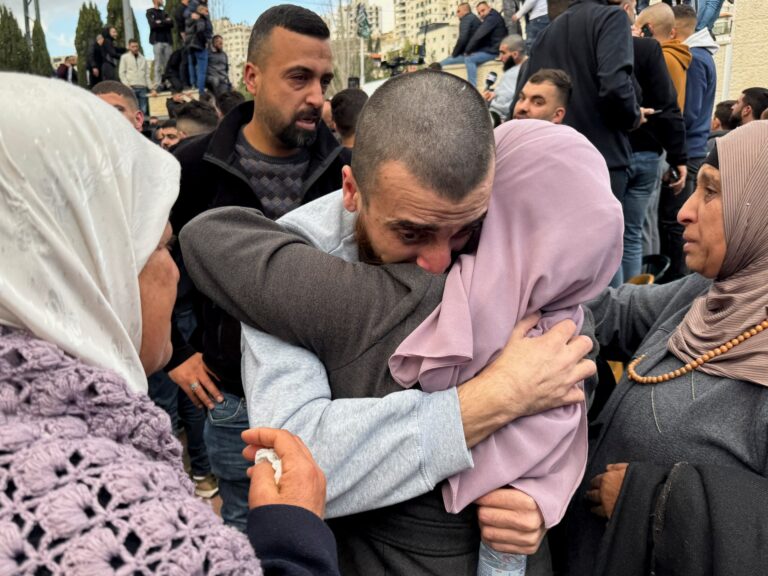As part of a ceasefire agreement that halted more than 15 months of war, Hamas released four female Israeli soldiers held in Gaza and released 200 Palestinian prisoners from Israeli prisons.
The International Committee of the Red Cross (ICRC) on Saturday transferred 128 Palestinian detainees to Gaza and the West Bank, with local authorities handling the remaining releases and transfers, the second exchange under the agreement that came into force last Sunday. confirmed that it was completed. .
Before the Israeli prisoners were released in Gaza City’s Palestine Square, dozens of masked Hamas and Palestinian jihadists gathered at the scene where a large number of Palestinians had also gathered.
The four women, Karina Aliyev, Daniela Gilboa, Nama Levi and Lili Albag, were paraded to the podium, waving and smiling. Perhaps he was threatened. They were then led into ICRC vehicles and transported to the Israeli army.
ICRC representatives and Hamas fighters were seen signing documents before his release.
Late Saturday, a bus carrying freed Palestinian prisoners was seen leaving Israel’s Ofer military prison in the occupied West Bank. Israel’s Prisons Authority announced that all 200 prisoners had been released according to a list published by Hamas.
Both releases were welcomed with cheers by Palestinian crowds in the occupied West Bank city of Ramallah and Israelis in Tel Aviv.
Israeli prisoners of war were among more than 200 soldiers and civilians captured in a Hamas-led offensive in southern Israel that killed at least 1,139 people on October 7, 2023, according to an Al Jazeera tally based on Israeli statistics. was also included.
In response to the attack, Israel launched a fierce war in the Gaza Strip that killed at least 47,283 people and destroyed much of the enclave’s civilian infrastructure, according to the Palestinian Health Authority.
Delay in return to northern Gaza
Despite the deal being completed on Saturday, both Israel and Hamas accused the other side of violating the terms of the ceasefire agreement.
Israel said that under the terms of the agreement, the captured civilian woman, Arbel Yehud, 29, should have been released before the soldiers. Hamas officials told Al Jazeera that Yehuda is alive and scheduled to be released next Saturday.
Yossi Mekelberg, an analyst at UK-based Chatham House, told Al Jazeera that disagreements over which prisoners to release and how to exchange them showed the instability of the current Gaza ceasefire agreement. He said he is doing so.
“It is a volatile and fragile situation, but the mediators are careful to ensure that no events are blown out of proportion,” Mekelberg said. “The international community needs to be constantly involved,” he added. day by day. “
Israeli Prime Minister Benjamin Netanyahu has said that Palestinians in the Gaza Strip will not be allowed to return to the northern part of the territory until the issue is resolved.
Thousands of Palestinians had been evacuated from northern Gaza during the conflict, and many were expected to return starting Sunday under the cease-fire agreement.
He said Israel has no plans to leave the Netzarim corridor, which runs through central Gaza, so Palestinians would still not be able to return to the north.
Hamas accused Israel of delaying implementation of the ceasefire agreement.
“We hold the occupier (Israel) responsible for the disruption in the implementation of the agreement and the impact on other bases,” the group said.
Al Jazeera’s Hind Khudary newspaper reported from Gaza’s Braeij refugee camp that many Palestinians attached great importance to Saturday’s prisoner-to-prisoner exchange, saying it would pave the way for their return to northern Gaza. He said he believed it.
Koudary, citing sources, said many displaced Palestinians had already gathered near the Wadi Gaza Strip in hopes of crossing north from Sunday.
Israel is also expected to open the southern Rafah border crossing to allow more humanitarian aid and other commercial supplies to enter the country.
Saturday’s exchange was the second since a ceasefire began on January 19, when Hamas handed over three Israeli civilian women in exchange for 90 Palestinian prisoners.
Palestinians detained in Israeli prisons
Of the 200 Palestinians released from Israeli prisons on Saturday, 121 were serving life sentences and 79 were serving long-term sentences.
The oldest prisoner is 69 years old and the youngest is 15 years old. 70 Palestinians are scheduled to be deported and Egypt will receive them for 48 hours.
As a result, they were sent to Tunisia, Algeria, and Turkiye, all of which agreed to accept them.
Tamer Karmut, associate professor at the Doha Graduate Institute, told Al Jazeera that the release of the Palestinian prisoners was a “huge relief” for their families, but that it was happening in the context of “the horrifying reality of[Israeli]occupation”. said.
“These prisoners should have been released through a great deal that would end the conflict, bring peace through negotiations, and end the occupation, but the harsh reality of Palestine is that the occupation continues as we speak. “There are,” Karmut told Al Jazeera.


